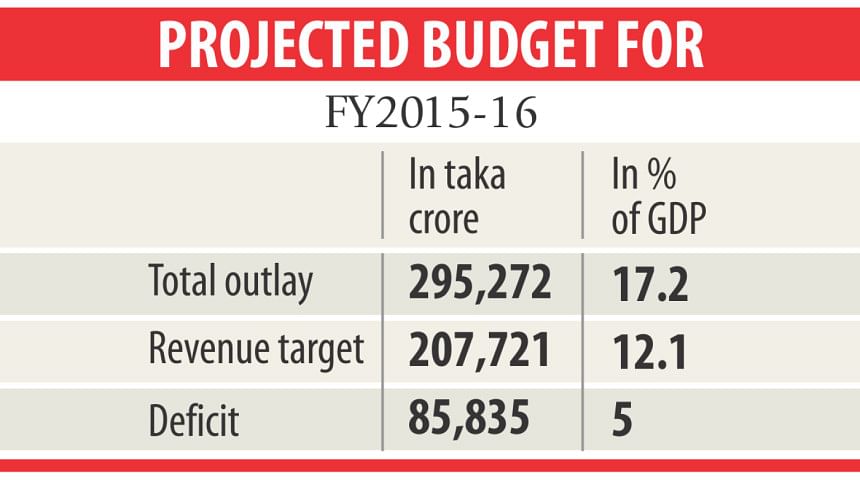Size shrinks for fund shortfall

The finance ministry will scale down its plan to lay out a budget upwards of Tk 300,000 crore for fiscal 2015-16, as it has failed to find viable sources to fund such a big outlay.
Now, a budget of Tk 295,272 crore is likely to be presented in parliament on Thursday so that the deficit stays within 5 percent of gross domestic product, in keeping with the loan conditions by the International Monetary Fund.
The revenue earning projection embedded in the draft budget is already optimistic compared with this year's actual performance, said a finance ministry official seeking anonymity.
The ministry could not stretch it any further to support a budget above Tk 300,000 crore as stated by Finance Minister AMA Muhith on May 22 in Sylhet.
The resource constraint puts a damper on IMF's efforts, which has long been pushing the government to raise its revenue earning capabilities so that it can roll out budgets matching its growth ambitions.
In fiscal 2015-16, around Tk 17,000 crore of additional funds are needed to finance the new pay scale, due to take effect from July, for civil servants, military officials, teachers and pensioners.
The ministry initially planned to keep that amount in block allocation. But now it is likely to put a lesser sum in block allocation to ensure that the budget stays in the neighbourhood of Tk 295,000 crore.
Some Tk 97,000 crore has been earmarked for the Annual Development Programme. In the last fiscal year, ministries and divisions managed to spend Tk 51,000 crore, and the figure is unlikely to exceed Tk 70,000 crore in the next fiscal year, said the official.
When the budget will be revised, the remaining amount in the ADP will be diverted to implement the new pay scale for government staffs.
In the current fiscal year, Tk 42,998 crore was kept for salaries and allowances of government employees and pensioners. In the next fiscal year, about Tk 60,000 crore will be needed for the purpose.
The total revenue earning target for the next year has been set at Tk 207,721 crore, up by 27 percent from this year's.
The National Board of Revenue has been tasked with fetching Tk 176,370 crore, but tax officials said they would be able to collect Tk 155,000 crore at best.
To achieve the target, Tk 41,370 crore would be needed in addition to what the NBR managed to collect this year. And the NBR officials are banking on heightened monitoring and GDP growth to bring in that sum.
The total budget deficit would then come down to Tk 85,835 crore.
Of the sum, Tk 56,651 crore would be managed by bank borrowings and savings instruments, and the rest from foreign assistance.
As in the past, it would not be possible to achieve the revenue generation and expenditure targets in the next fiscal year, said the official.
“So, it would not be difficult to maintain the budget discipline,” added the official.
In a recent report, the IMF said routine deviations were observed from the original budget figures in the past several years in Bangladesh.
Consistently, both the revenue and expenditure turnouts fell behind the budget targets, said the multilateral lender.
Over the last four years, revenues fell short of the budget targets by around 4 percent on average, said the IMF.
Similarly, expenditure outturns fell behind by 8.5 percent vis-à-vis the budget.
The main problem associated with the pattern is that while revenue forecasts in budget documents are merely projections, the expenditure allocations are legal spending authorisations, said the IMF.
“Thus, if revenues fail to materialise, there is a risk that the line ministries may still execute in full their spending envelopes, leading to larger-than-expected fiscal deficits and financing needs.”

 For all latest news, follow The Daily Star's Google News channel.
For all latest news, follow The Daily Star's Google News channel. 




Comments